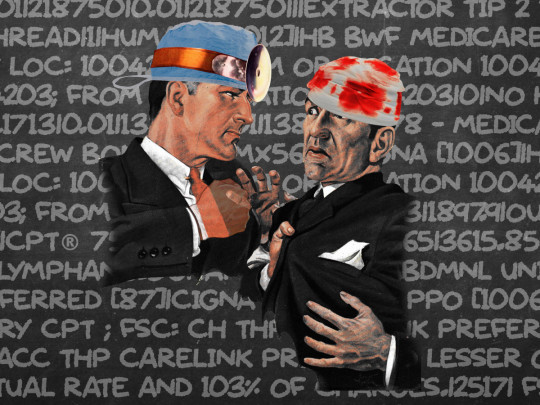#Podcasting Market
Text
Podcasting Market Worth $130.63 Billion By 2030 | CAGR 27.6%
The global podcasting market size is expected to reach USD 130.63 billion by 2030, registering a CAGR of 27.6% from 2023 to 2030, according to a new report by Grand View Research, Inc. Podcasting is an episodic series of digital media, often audio, that can be listened to or watched over the internet or downloaded on a device. The increasing popularity of audio-on-demand platforms is the primary factor driving the market growth. Other factors contributing to the market growth include minimal entry barriers for the creators and easy accessibility for the users, as they can listen to podcasts while performing tasks such as cleaning, walking, gardening, traveling, or exercising.
The recent evolution of podcasting content, wherein various creators are discussing un debated global scenarios, is bringing about numerous growth opportunities for the market. The subscriber base of podcasts pertaining to racism, patriarchy, and political disputes, among others, is significantly growing, thereby encouraging companies and creators to come up with more content that taps diverse audiences.
For instance, in June 2021, iHeartMedia, Inc. partnered with Celsius, the global industry-leading crypto currency yield–earning platform, to launch a new iHeartRadio original podcast network and reach out to new audiences with crypto currency education in creative and innovative ways.
In addition, in December 2022, Spotify partnered with Inevitable Foundation, a non-profit organization for disabled people, to support and empower podcasters with disabilities. Meanwhile, challenges such as limited mobile phone storage and low internet connectivity are likely to hinder the market growth during the forecast period.
The COVID-19 outbreak has unfolded new opportunities for the podcasting platform, where many creators are offering content with the sole purpose of educating the global population on the hidden long-term effects of the coronavirus. National public health organizations and private healthcare entities are also releasing podcasts to spread awareness among the masses about the prevention of the virus. For instance, the American Hospital Association (AHA) has released a podcast to talk about community health improvement during and after the pandemic.
Request a free sample copy or view report summary: Podcasting Market Report
Podcasting Market Report Highlights
Based on genre, the news and politics segment dominated with a revenue share of more than 27.0% of the overall market in 2022. The increasing need for receiving updated information on global events has resulted in the segmental growth
Based on format, the solo segment is estimated to account for a reasonable share, expanding at a CAGR of above 29.0% from 2023 to 2030. Market entry is the easiest with this format as the host requires only basic equipment and related software to record podcasts
Latin America is expected to record the fastest growth, registering a CAGR of more than 37.0% from 2023 to 2030. This can be attributed to the increasing popularity of digital devices coupled with the accessibility of podcasting content offered in Spanish
Podcasting Market Segmentation
Grand View Research has segmented the global podcasting market based on the genre, format, and region:
Podcasting Genre Outlook (Revenue, USD Million, 2018 - 2030)
New & Politics
Society & Culture
Comedy
Sports
Others
Podcasting Format Outlook (Revenue, USD Million, 2018 - 2030)
Interviews
Panels
Solo
Repurposed Content
Conversational
Podcasting Regional Outlook (Revenue, USD Million, 2018 - 2030)
North America
U.S.
Canada
Europe
U.K.
Nordic Countries
Asia Pacific
China
South Korea
Australia
Latin America
Brazil
Mexico
Middle East & Africa
List of Key Players in Podcasting Market
Amazon.com, Inc.
Apple, Inc.
iHeartMedia Inc.
Megaphone LLC
Pandora Media, LLC
Audacy, Inc.
Sound Cloud Limited
Spotify AB
Stitcher
Tune In, Inc.
0 notes
Text






so john has complete control of arthur’s left hand, yeah?
#hey john i think i have a solution for your feelings of lack of agency#idek i was bored at a market today. here’s this#amazing how i was able to draw him looking like a different guy in each of these#has someone done this before? they must have#malevolent#malevolent podcast#arthur lester#john doe#oscar malevolent#procrastinating animating… i need to finish wolf animatic
4K notes
·
View notes
Text
Podcasting Market Outlook On The Basis Of Genre, Format, Region And Forecast To 2030: Grand View Research Inc.
San Francisco, 1 Sep 2023: The Report Podcasting Market Size, Share & Trends Analysis Report By Genre (News & Politics, Society & Culture, Comedy, Sports), By Format (Interviews, Panels, Solo), By Region, And Segment Forecasts, 2023 – 2030
The global podcasting market size is expected to reach USD 130.63 billion by 2030, registering a CAGR of 27.6% from 2023 to 2030, according to a new report by…

View On WordPress
#Podcasting Industry#Podcasting Market#Podcasting Market 2023#Podcasting Market 2030#Podcasting Market Revenue#Podcasting Market Share#Podcasting Market Size
0 notes
Text


Posting more duck team polycule doodles because every time I listen to campaign three my love for them is reinvigorated tenfolds and i think about them for the next week.
i was just thinking about how funny itd be if in a moment of insecurity Sol worries about what Calder and Callie think of him meanwhile those two are head over heels in love. like pining and yearning so hard it makes them dizzy.
Also no I am never letting the “Make Out Every Hour” lie go ever. Im gripping that bit so hard my hand is going to go numb.
#not another dnd podcast#naddpod#naddpod fanart#naddpod campaign 3#duck team#ducklycule#sol bufo#calliope petrichor#calder kilde#not pictures properly but they’re all wearing track jackets callie’s is just tied around her waist#anyways they love him a lot they truly believe they’ve bagged the baddest bitch on the market#and theyre right
209 notes
·
View notes
Text
The health industry’s invisible hand is a fist

On June 21, I'm doing an ONLINE READING for the LOCUS AWARDS at 16hPT. On June 22, I'll be in OAKLAND, CA for a panel and a keynote at the LOCUS AWARDS.

The US has the rich world's most expensive health care system, and that system delivers the worst health outcomes of any country in the rich world. Also, the US is unique in relying on market forces as the primary regulator of its health care system. All of these facts are related!
Capitalism's most dogmatic zealots have a mystical belief in the power of markets to "efficiently allocate" goods and services. For them, the process by which goods and services are offered and purchased performs a kind of vast, distributed computation that "discovers the price" of everything. Our decisions to accept or refuse prices are the data that feeds this distributed computer, and the signals these decisions send about our desires triggers investment decisions by sellers, which guides the whole system to "equilibrium" in which we are all better off.
There's some truth to this: when demand for something exceeds the supply, prices tend to go up. These higher prices tempt new sellers into the market, until demand is met and prices fall and production is stabilized at the level that meets demand.
But this elegant, self-regulating system rarely survives contact with reality. It's the kind of simplified model that works when we're hypothesizing about perfectly spherical cows of uniform density on a frictionless surface, but ceases to be useful when it encounters a messy world of imperfect rationality, imperfect information, monopolization, regulatory capture, and other unavoidable properties of reality.
For members of the "efficient market" cult, reality's stubborn refusal to behave the way it does in their thought experiments is a personal affront. Panged by cognitive dissonance, the cult members insist that any market failures in the real world are illusions caused by not doing capitalism hard enough. When deregulation and markets fail, the answer is always more deregulation and more markets.
That's the story of the American health industry in a nutshell. Rather than accepting that people won't shop for the best emergency room while unconscious in an ambulance, or that the "clearing price" of "not dying of cancer" is "infinity," the cult insists that America's worst-in-class, most expensive health system just needs more capitalism to turn it into a world leader.
In the 1980s, Reagan's court sorcerers decreed that they could fix health care with something called "Prospective Payment Systems," which would pay hospitals a lump sum for treating conditions, rather than reimbursing them for each procedure, using competition and profit motives to drive "efficiency." The hospital system responded by "upcoding' patients: if you showed up with a broken leg and a history of coronary disease, they would code you as a heart patient and someone who needed a cast. They'd collect both lump sums, slap a cast on you, and wheel you out the door:
https://www.ncbi.nlm.nih.gov/pmc/articles/PMC4195137/
As Robert Kuttner writes for The American Prospect, this kind of abuse was predictable from the outset, especially since Health and Human Services is starved of budget for auditors and can only hand out "slaps on the wrist" when they catch a hospital ripping off the system:
https://prospect.org/economy/2024-06-13-fantasyland-general/
Upcoding isn't limited to Medicare fraud, either. Hospitals and insurers are locked in a death-battle over payments, and hospitals' favorite scam is sending everyone to the ER, even when they don't have emergencies (some hospitals literally lock all the doors except for the ER entrance). That way, a normal, uncomplicated childbirth can be transformed into a "Level 5" emergency treatment (the highest severity of emergency) and generate a surprise bill of over $2,700:
https://pluralistic.net/2021/10/27/crossing-a-line/#zero-fucks-given
The US health industry is bad enough to generate a constant degree of political will for change, but the industry (and its captured politicians and regulators) is also canny enough to dream up an endless procession of useless gimmicks designed to temporarily bleed off the pressure for change. In 2018, HHS passed a rule requiring hospitals to publish their prices.
Hospitals responded to this with a shrewd gambit: they simply ignored the rule. So in 2021, HHS made another rule, creating penalties for ignoring the first rule:
https://www.cms.gov/priorities/key-initiatives/hospital-price-transparency/hospitals
The theory here was that publishing prices would create "market discipline." Again, this isn't wholly nonsensical. To the extent that patients have nonurgent conditions and the free time to shop around, being able to access prices will help them. Indeed, if the prices are in a standards-defined, machine-readable form, patients and their advocates could automatically import them, create price-comparison sites, leaderboards, etc. None of this addresses the core problem that health-care is a) a human right and b) not a discretionary expense, but it could help at the margins.
But there's another wrinkle here. The same people who claim that prices can solve all of our problems also insist that monopolies are impossible. They've presided over a decades-long assault on antitrust law that has seen hospitals, pharma companies, insurers, and a menagerie of obscure middlemen merge into gigantic companies that are too big to fail and too big to jail. When a single hospital system is responsible for the majority of care in a city or even a county, how much punishment can regulators realistically subject it to?
Not much, as it turns out. Kuttner describes how Mass Gen Brigham cornered the market on health-care in Boston, allowing it to flout the rules on pricing. In addition to standard tricks – like charging self-pay patients vastly more than insured payments (because individuals don't have the bargaining power of insurers), Mass Gen Brigham's price data is a sick joke.
See for yourself! The portal will send you giant, unstructured, ZIPped text files filled with cryptic garbage like:
ADJUSTABLE C TAPER NECK PLUS|1|UNITED HEALTHCARE [1016]|HB CH UNITED HMO / PPO / INDEMNITY [34]|UNITED HEALTHCARE HMO [101604]|75|Inv Loc: 1004203; from OR location 1004203|52.02|Inpatient PAF; 69.36% Billed|75|Inv Loc: 1004203; from OR location 1004203|56.87|Outpatient PAF; 75.83% Billed
https://www.massgeneralbrigham.org/en/patient-care/patient-visitor-information/billing/cms-required-hospital-charge-data
These files have tens of thousands of rows. As a patient, you are meant to parse through these in order to decide whether you're getting ripped off on that HIP STEM 16X203MM SIZE 4 FEMORAL PRESS FIT NEUTRAL REVISION TITANIUM you're in the market for (as it happens, I have two of these in my body).
Kuttner describes the surreal lengths he had to go through to prevent his mother from getting ripped off by Mass Gen through an upcoding hustle. By coding her as "admitted for observation," Mass Gen was able to turn her into an outpatient, with a 20% co-pay (this is down to a GW Bush policy that punishes hospitals that charge Medicare for inpatient care when they could be treated as outpatients – hospitals reflexively game the system to make every patient an outpatient, even if they have overnight hospital stays).
Kuttner's an expert on this: he was national policy correspondent for the New England Journal of Medicine and covers the health beat for the Prospect. Even so, it took him ten hours of phone calls to two doctors' offices and Blue Cross to resolve the discrepancy. The average person is not qualified to do this – indeed, the average person won't even know they've been upcoded.
Needless to say that people in other countries – countries where health care is cheaper and the outcomes are better – are baffled by this. Canadians, Britons, Australians, Germans, Finns, etc do not have to price-shop for their care. They don't have to hawkishly monitor their admission paperwork for sneaky upcodes. They don't have to spend ten hours on the phone arguing about esoteric billing practices.
In a rational world, we'd compare the American system to the rest of the world and say, "Well, they've figured it out, we should do what they're doing." But in good old U-S-A! U-S-A! U-S-A!, the answer to this is more prices, more commercialization, more market forces. Just rub some capitalism on it!
That's where companies like Multiplan come in: this is a middleman that serves other middlemen. Multiplan negotiates prices on behalf of insurers, and splits the difference between the list price and the negotiated price with them:
https://www.nytimes.com/2024/04/07/us/health-insurance-medical-bills.html
But – as the Arm and a Leg podcast points out – this provides the perverse incentive for Multiplan to drive list prices up. If the list price quintuples, and then Multiplan drives it back down to, say, double the old price, they collect more money. Meanwhile, your insurer sticks you with the bill, over and above your deductible and co-pay:
https://armandalegshow.com/episode/multiplan/
The Multiplan layer doesn't just allow insurers to rip you off (though boy does it allow insurers to rip you off), it also makes it literally impossible to know what the price is going to be before you get your procedure. As with any proposition bet, the added complexity is there to make it impossible for you to calculate the odds and figure out if you're getting robbed:
https://pluralistic.net/2022/05/04/house-always-wins/#are-you-on-drugs
Multiplan is the purest expression of market dynamics brainworms I've yet encountered: solving the inefficiencies created by the complexity of a system with too many middlemen by adding another middle-man who is even more complex.
No matter what the problem is with America's health industry, the answer is always the same: more markets! Are older voters getting pissed off at politicians for slashing Medicare? No problem: just create Medicare Advantage, where old people can surrender their right to government care and place themselves in the loving hands of a giant corporation that makes more money by denying them care.
The US health industry is a perfect parable about the dangers of trusting shareholder accountable markets to do the work of democratically accountable governments. Shareholders love monopolies, so they drove monopolization throughout the health supply chain. As David Dayen writes in his 2020 book Monopolized the pharma industry monopolized first, and put the screws to hospitals:
https://pluralistic.net/2021/01/29/fractal-bullshit/#dayenu
Hospitals formed regional monopolies to counter the seller power of consolidated Big Pharma. That's Mass Gen's story: tapping the capital markets to buy other hospitals in the region until it became too big to fail and too big to jail (and too big to care). Consolidated hospitals, in turn, put the screws to insurers, so they also consolidated, fighting Big Hospital's pricing power.
Monopoly at any point in a supply chain leads to monopoly throughout the supply chain. But patients can't consolidate (that's what governments are for – representing the diffuse interests of people). Neither can health workers (that's what unions are for). So the system screwed everyone: patients paid more for worse care. Health workers put in longer hours under worse conditions and got paid less.
Kuttner describes how his eye doctor races from patient to patient "as if he was on roller skates." When Kuttner wrote him a letter questioning the quality of care, the eye doctor answered that he understood that he was giving his patients short shrift, but explained that he had to, because his pay was half what he needed, relegating him to a small apartment and an old car. The hospital – which skims the payments he gets for care – sets his caseload, and he can't turn down patients.
The answers to this are obvious: get markets out of health care. Unionize health workers. Give regulators the budgets and power to hold health corporations to account.
But for market cultists, all of that can't work. Instead, we have to create more esoteric middlemen like "pharmacy benefit managers" and Multiplan. We need more prices to shovel into the market computer's data-hopper. If we just capitalism hard enough, surely the system will finally work…someday.

If you'd like an essay-formatted version of this post to read or share, here's a link to it on pluralistic.net, my surveillance-free, ad-free, tracker-free blog:
https://pluralistic.net/2024/06/13/a-punch-in-the-guts/#hayek-pilled
#billing codes#health#corruption#ripoffs#arm and a leg podcast#robert kuttner#prices#austrian economics#Prospective Payment Systems#the invisible hand#shop around#a market for lemons#monopoly#monopolization#upcoding
239 notes
·
View notes
Text
Gonna be real, capitalism exploiting the shit out of the divine in The Silt Verses is like my favorite worldbuilding choice ever.
#malu.text#the silt verses#the whole podcast is like 'what if you handed Posseidon to a bunch of marketing executives?' and it's sooo fucked up
59 notes
·
View notes
Text
I didn’t want to hijack the person’s post bc I don’t care what they think but I am a defensive bitch so we’re talking about this
Logan and Oscar met when they were 13/14. The next year they were on the same karting team together but didn’t race each other directly. This would be the last time they don’t race each other until 2019 when Logan moved up to F3 and Oscar was still in Formula Renault. They had a championship battle in F4 and F3, they were teammates in 2020, they haven’t raced each other since then which has been the biggest gap since they’ve known each other.
That still doesn’t mean they’re friends though. You know what does? Them literally saying they are.
Oscar saying “I’m quite close with Logan Sargeant” on that podcast. The Miami GP 2023 post. Them playing paddle together. Logan in that interview where they asked about “Loscar.” Now the podcast episode.
They aren’t forced to be around each other, if anything they’re so busy they don’t have time to hang out, yet they still seek each other out when they have the opportunity. Obviously we don’t know anything about their personal lives but at the very least we know they’re friends?? Not brocedes level of friends, maybe lestappen level of friends cause I don’t think they’re actual friends either, definitely not galex level of friends but that can also be attributed to the fact they don’t talk about themselves a lot, compared to Alex or George who post everything about their lives.
Like, have you ever seen them interact? They’re chilling they’re casual but they are friends. Whatever you think about their dynamic they are at least that.
#just wild take to make to me#logan and oscar: yeah we’re friends#random person on the internet: i don’t believe you#yeah the fandom might be exaggerating it that’s what we do#but it’s not like we’re just making shit up ??#‘logan and oscar aren’t actually friends’ and i couldn’t let that slide#logan sargeant#oscar piastri#loscar#maybe a problem is that some people who like loscar don’t know The Lore so they just go off of what they believe from this year#also is there any marketing thing where it’s just logan and oscar?#like there’s the FOL videos and now the podcast but we never see them interacting directly#can you even tell if someone is friends or not until they’ve been forced to do challenges by a social media managaer who gets a fourth of#their salary? /j
142 notes
·
View notes
Text
"maybe I should start a podcast" no. that's the devil talking
#much love to (most) podcasters but the market is oversaturated. no more podcasts. sorry 😔#that said if you DO have a podcast. i would like to come on it. please.#ok to rb
103 notes
·
View notes
Text

Someone called Arthur an eldritch squeaky toy in chat earlier and. Well.
Bonus comfort for investigators:

#malevolent#malevolent podcast#arthur lester#john doe#kayne malevolent#the king in yellow#he’s here it count#my art#malevolent fanart#doodles#sketches#Arthur malevolent#john malevolent#John! what happened! Arthur! I don’t know! I think they turned you into some form of marketable plush!
661 notes
·
View notes
Text
my east coast friends, when they came to visit me in california, would always be like oh my god, kas you live like this? when i drove them on our freeways. kas you know there's a better way to create a highway that isn't needlessly dangerous right?? six lanes wildly unsafe merges for three different highways?? OKAY??? AND??? I JUST PAID OHIO $21.25 TO DRIVE ACROSS THE STATE. TWENTY-ONE AMERICAN DOLLARS. I DROVE FROM CALIFORNIA TO IOWA PAYING ZERO DOLLARS AND NOW ILLINOIS, INDIANA, OHIO, AND PENNSYLVANIA WANT ME TO PAY FOR THE PRIVILEGE OF DRIVING ON AN INTERSTATE? THAT'S A PUBLIC HIGHWAY. FUCK OFF. i think i paid over $40 in tolls across four states and for WHAT. my tempestuous assignation with the capricious i-80 comes to a catastrophic end. i yearn for the stress of a wyoming lightning storm. like bro what is that $21 even paying for?? the nicer rest stops sorry "service plazas"? what?? i don't WANT a clean bathroom and a dunkins, i want a suspect bathroom in a building that looks like it was made by laura ingalls wilder's dad, a beautiful scenic view, and a trucker looking at me appraisingly from across the median!! i want americana and human connection, i don't want a latte made by a teenager that will make my stomach hurt!! "ohhh kas bay area highways are a nightmare there is no reason for it to be this bad" WE SHOULDN'T HAVE TO PAY FOR A PUBLIC HIGHWAY. NONE OF US HAVE TO LIVE LIKE THIS. THE PROBLEM IS USAMERICAN INFRASTRUCTURE!!
#i'm suffering severe culture shock in my own country#chicago didn't even say how i am supposed to pay the toll so i guess i just get publicly executed if i ever attempt to drive there again#ohhhhh i have been in a car for four days by myself and only saw two friends along the way. i am too social for that much alone time#i had so many podcasts downloaded...did not listen to any#music all the way through. the vibe is unreal weird rn. i have become so deeply unhinged. i hope i recover soon#and i was driving at night suffering severe highway hypnosis and all of sudden realized i was surrounded by mountains??#did not know the appalachian mountains extended this far west??#where am i. what is happening to me. i hope my stuff doesn't get stolen overnight in the car (<- not due to appalachia. due to america)#man i hope i can go to church next week...i need it lol my spirit is so disturbed from this trip#soon i get to see my apartment though!!! and maybe my dog will figure out its his home and calm down. he has hated this entire trip#and i'll be in a walkable city...with many farmers markets....oh my gosh#fresno oilers.txt
27 notes
·
View notes
Text

Funny design meme 😅
#designer#jpg#pdf#jesus christ#faith in jesus#meme humor#dark humor#graphic design#creative#business#investor#marketing#blogger#podcast
46 notes
·
View notes
Note
I don't watch midst, but consider: the song popular from wicked the musical, but instead of popular it's bocular. Is this anything
this is ABSOLUTELY something. I fully believe this would be a jingle in a commercial that every kid in the highest light loves and every parent fucking hates
#jedidiah pom cannot convince marketing to cut it because it really does so well as an earworm and it has run for YEARS#jonas spahr has barely restrained himself from flipping his lid at someone while this is stuck in his head on multiple occasions#midst podcast#BOCS!
26 notes
·
View notes
Text

The 2024 Malevolent Madness Mixup event just concluded with a slew of astounding collaborative works! So, it's time to celebrate them with...
✨BMV & MMM Collab: Twitch Stream Days✨
All fics will be reviewed, however, the first week's fics will be read blind by the voice actors at Black Market Voices! The second week will have excerpts read aloud. All art will be shown on the stream unless otherwise requested by the artist!
All times in EST
Blind Reads
✨Sun April 14, 7-10pm - Of Shadow and Simplicity / War at Home
✨Tues April 16, 730-10pm - Waters of Leophryne
✨Wed April 17, 7-10pm - God of Cowboys and Fools
✨Fri April 19, 7-10pm - Toe Tags and Second Chances / The Cost of Indomitability
✨Sun April 21, 7-10pm - And In Blood Is Born Anew
Reviews & Excerpts
✨Mon April 22, 7-10pm - Fics: Lasc1are_Su0nare / Blood and Sand
✨Tues April 23, 7-10pm - Fic: In Golden Gags
✨Wed April 24, 7-10pm - Fics: (Help Me) I've Got No Soul To Sell / Sillage
✨Fri April 26, 7-10pm - Fic: The Moon Had Turned To Gold
Please join us to celebrate these amazing events works! Event will be held on twitch at vmprsm
We look forward to seeing you there!
#malevolent madness mixup#mmm#mmm2024#malevolent#malevolent podcast#malevolent fanart#malevolent fanfic#malevolent event#twitch#twitch stream#black market voices#bmv#BMV & MMM Collab: Twitch Stream Days#collab#colalboration
43 notes
·
View notes
Note
the only way I see a reconciliation happen would be if marc goes back to honda and luca stays so they’d forced to be somehow close to each other. and luca would never allow vale to start some drama because he’s made pretty clear he doesn’t give a f*** about their drama and does no want to be involved in that.
repsol honda 2025. god willing

#motogp#callie speaks#asks#rosquez#listenign to the race motogp podcast and uh. getting stressed about the 2025 riders market. girl chill
41 notes
·
View notes
Text
one thing i will say tho, and this applies to all the trainers, is i just dunno how i would feel as a driver if my trainer was going on podcasts and making money off of talking about me and my personal shit
#not all of them do it obviously#but also#there has got to be a bit of a friendship barrier crossed when ur side hustle is marketed off of ur driver???#or ur going onto podcasts and making money off of talking about their personal problems or stories or whatever#idk it would irk me like would i feel fully comfortable talking to u about my issues if i know ur just gunna chat about it on a pod????#food 4 thought#and michael italiano loves a podcast
87 notes
·
View notes